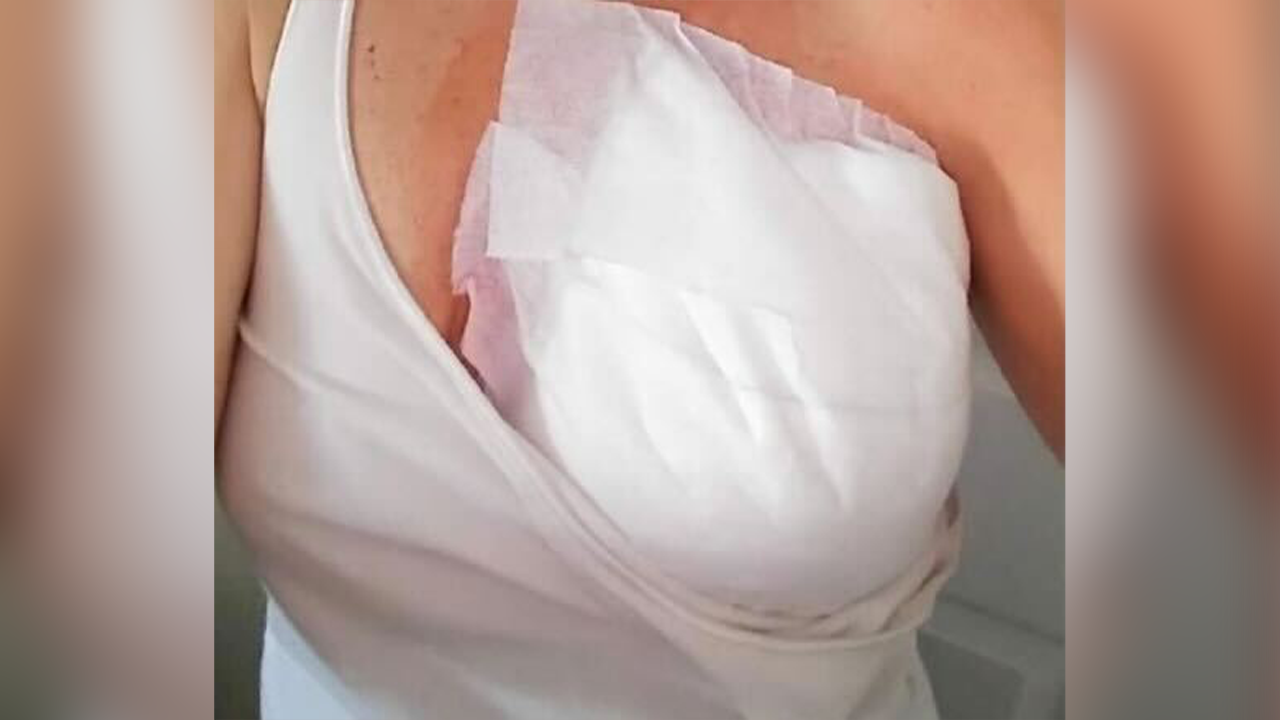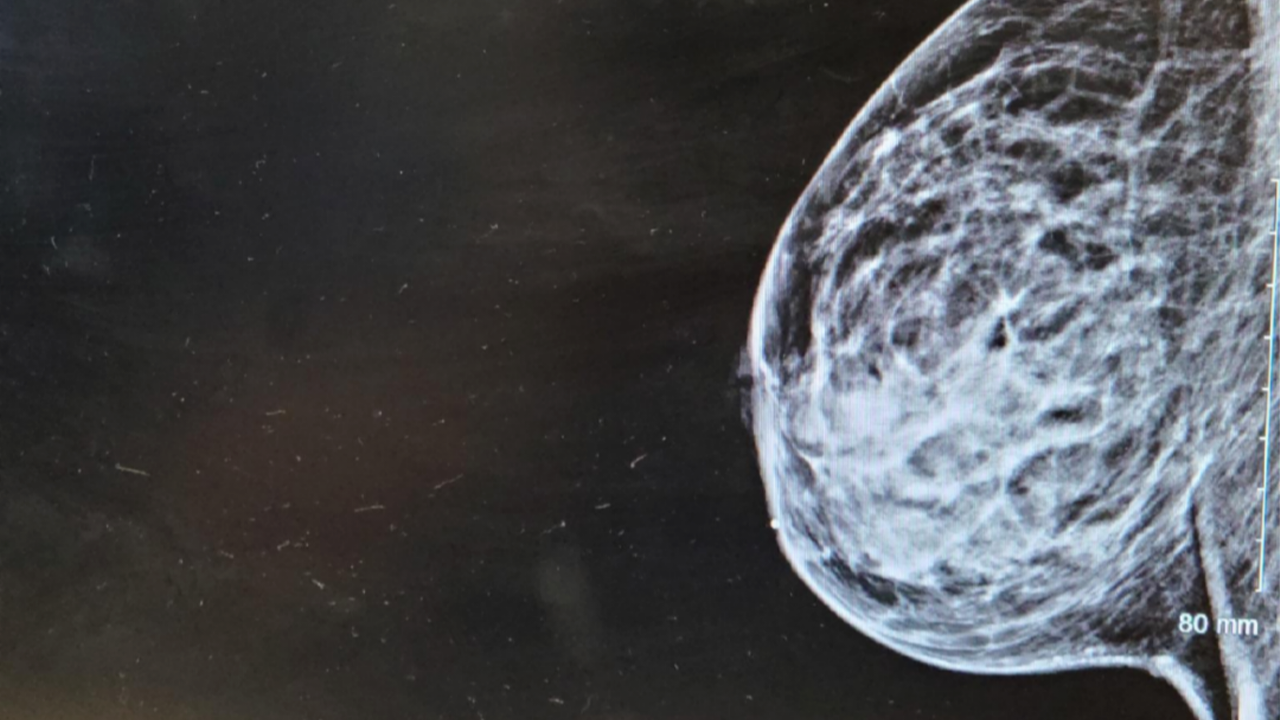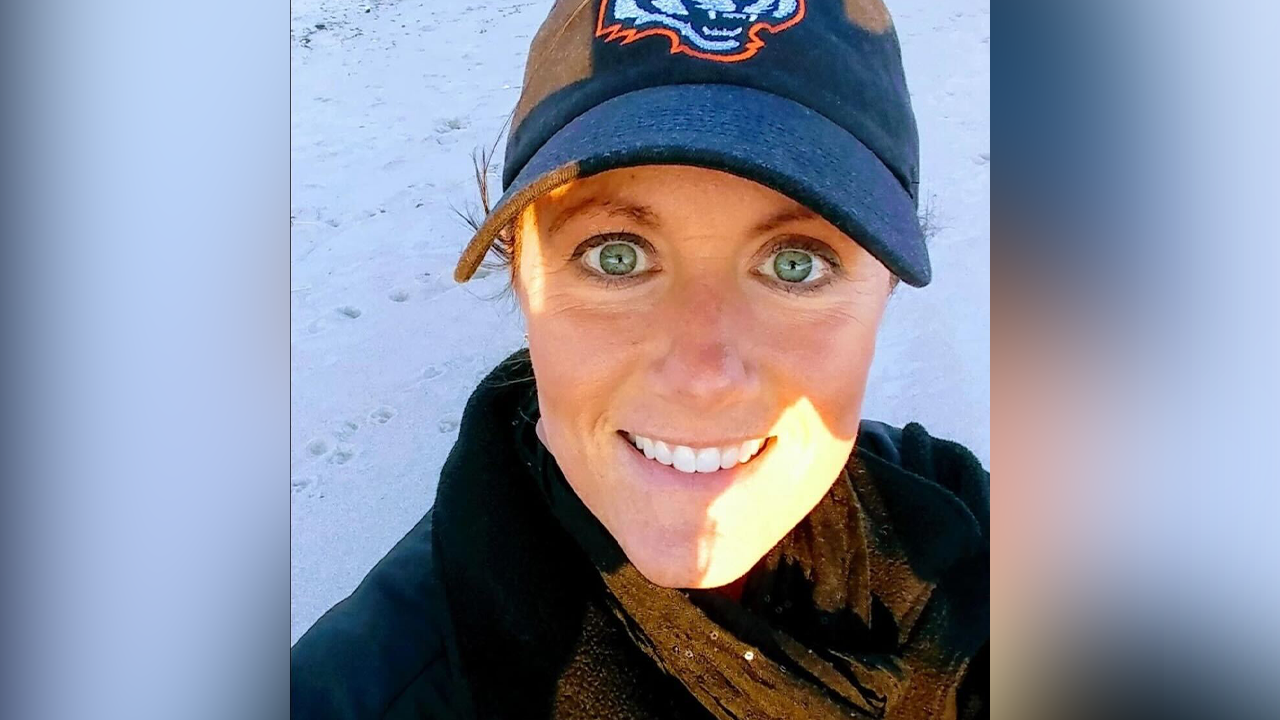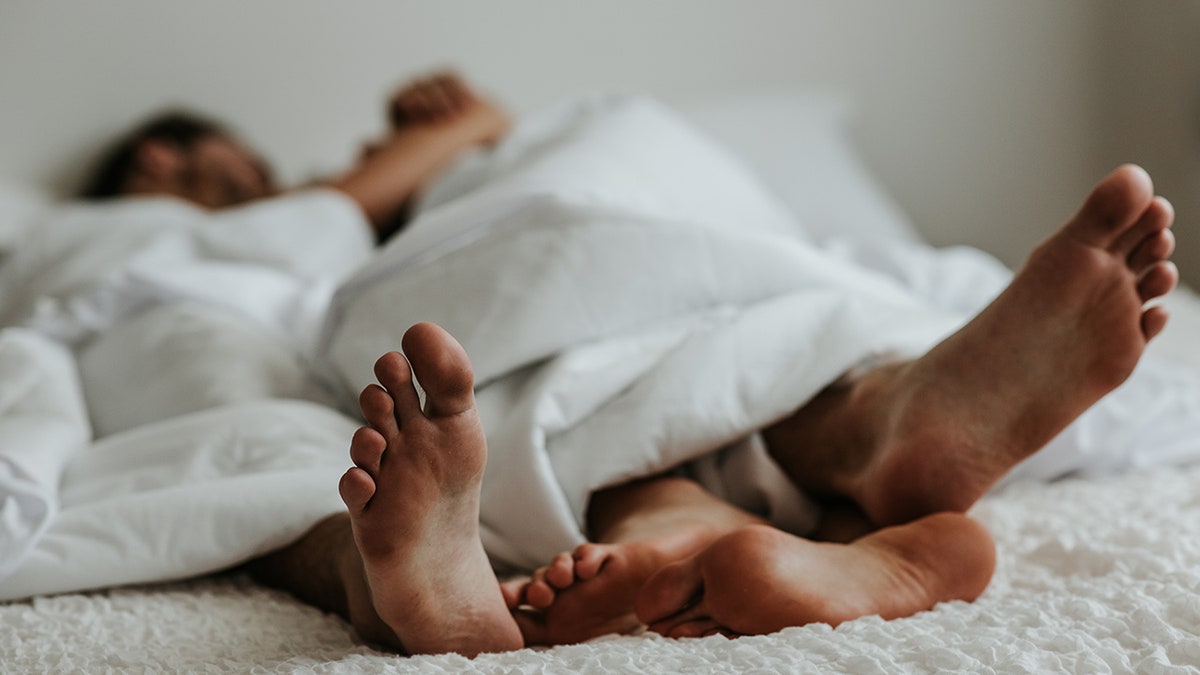Health
Ohio woman details health journey after contracting rare infectious breast disease on a business trip

After contracting an incredibly rare infectious breast disease, an Ohio woman was shocked to self-discover that it came from contaminated water.
“It was me that found the test to result the bacteria, and it was me leading the way to find out how I contracted it,” Tami Burdick, of Cincinnati, told Fox News Digital. Burdick wrote a memoir of her health journey of self-diagnosis called, “Diagnosis Detective: Curing Granulomatous Mastitis.”
Tami Burdick is an author and advocate for granulomatous mastitis. She shares her story of self-diagnosis in her book, “Diagnosis Detective: Curing Granulomatous Mastitis.” (Tami Burdick)

An image of Tami Burdick post-operation. Burdick said that she has two scars from her breast surgery. (Tami Burdick)
In January 2017, Burdick went to Connecticut for a business trip, but roughly two months upon her return home, she began experiencing a host of symptoms. Burdick shared that she began experiencing breast pain and after a self-evaluation she discovered a hard lump.
Assuming an impending cancer diagnosis, Burdick promptly called her primary care physician, who ordered a mammogram and ultrasound of the infected area. After Burdick’s biopsy, she was released that it was not a cancer diagnosis instead it was a rare infection.
DANGERS YOU CAN’T SEE MAY BE LURKING IN YOUR UNWASHED BEDDING, SAYS STUDY: BEWARE OF ‘HEALTH CONCERNS’
Burdick was diagnosed with granulomatous mastitis (GM) a “rare chronic inflammatory breast condition” that is incredibly painful.
“I was most certainly relieved it wasn’t cancer, though I could have never imagined how this breast disease would soon reveal its ugly head like the monster it was,” Burdick said.

Tami Burdick began researching Corynebacterium kroppenstedtii after a test revealed that it was the root cause for her breast disease. (Tami Burdick)
Despite Burdick’s diagnosis, she still did not know what had caused her condition, nor a path forward for treatment and recovery. Eventually, Burdick came across a Facebook support group, where she connected with other women from all across the world who also have GM.
Seven months from her initial diagnosis, Burdick uncovered a gene sequencing pathology test that a woman in her support group recommended.
“It ultimately helped save my life,” Burdick said.
“It ultimately helped save my life.”

Tami Burdick and her doctor and friend, Dr. Kelly McLean. Dr. McLean ordered the pathology test that eventually revealed Burdick’s root cause — bacteria mostly associated with water. (Tami Burdick)
After requesting that she could do the test, Burdick finally figured out where the cause for her painful breast infection.
“The reason why I called my book ‘Diagnosis Detective’ was because it was me that figured everything out before the doctor, Burdick told Fox News Digital. “I found a test that would finally result the infection after seven months. I knew something was causing it.”
“And finally, after seven months, we had an answer,” Burdick said.
CONTAMINATED BEACH WATER COULD MAKE SWIMMERS SICK, WARNS NEW POLLUTION REPORT: ‘SEVERAL TROUBLING TRENDS’
The pathology test revealed Corynebacterium kroppenstedtii as the root cause of Burdick’s disease.
Corynebacterium kroppenstedtii is an environmental-originated bacteria associated mostly with water, sewage and soil.

Tami Burdick, left, and her oncologist, Dr. Kelly McLean, wear “GM” advocacy T-shirts. (Tami Burdick)

The first picture is Tami Burdick’s original mammogram prior to her ultrasound-guided core needle biopsy that would then result in her diagnosis of granulomatous mastitis. (Tami Burdick)
Burdick next order of business was finding out how she contracted the bacteria.
She had her water tested in her home for the Corynebacterium kroppenstedtii, but the results were negative. Burdick said that she had not been in a pool, hot tub, or any other bodies of water for “quite some time.”
MOST US STATES FAILING TO PROTECT SCHOOLS’ WATER FROM LEAD CONTAMINANTS, STUDY FINDS
Research about the bacteria told Burdick that it needed a natural point of entry, like a pore or duct opening.
Eventually, Burdick and her medical team came to believe that she contracted the nasty bacteria from her hotel shower during her 2017 business trip.

Tami Burdick’s first time returning to the Northeast since her diagnosis of granulomatous mastitis. She says she contracted the rare disease from a hotel shower during a business trip to Connecticut in 2017. (Tami Burdick)
CLICK HERE TO SIGN UP FOR OUR HEALTH NEWSLETTER
Years after Burdick’s diagnosis with GM, she is still advocating for this rare infectious disease that affects 2.4 women per 100,000.
“I have two scars on my breast. One is towards the top and the other one is underneath,” Burdick said. “I see them every single day, and I call them my warrior wounds.”
She said that her scars are a reminder to keep sharing her story with the world and to keep advocating for others facing GM.
“I even wrote in my book that God gives his battles to his strongest soldiers and that God knew that there needed to be a voice for this disease,” Burdick said. “At the end of the day, it’s all about helping people.”

Health
3 Readers Lost 448 Lbs—Here Are the Tips They Wish They Knew Sooner

Use left and right arrow keys to navigate between menu items.
Use escape to exit the menu.
Sign Up
Create a free account to access exclusive content, play games, solve puzzles, test your pop-culture knowledge and receive special offers.
Already have an account? Login
Health
Couples who cuddle before sleep reap key health benefits, study reveals

NEWYou can now listen to Fox News articles!
Snuggling with your partner could be a win-win for your health.
Cuddling at night promotes more secure attachment between partners and lowers stress levels, according to a new study published in the Journal of Social and Personal Relationships.
Researchers from Auburn University examined data from 143 heterosexual “bed-sharing” couples, analyzing associations between physical closeness at sleep onset, perceived stress, attachment insecurity and sleep disturbance.
MOST SLEEP-DEPRIVED CITIES IN US REVEALED IN REPORT: WHERE DOES YOURS RANK?
Factors including daytime sleepiness, income, age, relationship length, sleep diagnoses and whether children or pets sleep in the bed were also considered.
The results revealed that couples who assumed a physically closer position upon going to sleep were indirectly linked with “lower couple insecure attachment” (when they have trouble connecting emotionally) and lower stress.
Couples who cuddle are less stressed and more secure, according to a new study. (iStock)
The researchers found no “significant” associations between physical closeness at sleep onset and the chances of sleep disturbance.
While stress was found to be lower among cuddlers, the research found that cuddling did not increase sleep quality.
The researchers concluded that physical closeness at sleep onset “may be a promising and amenable avenue for improving relational and physiological well-being.”
HERE’S WHY 90% OF AMERICANS DON’T SLEEP THROUGH THE NIGHT, ACCORDING TO EXPERT
Sleep expert Wendy Troxel, PhD — a RAND Corporation senior behavioral specialist and licensed clinical psychologist in Utah — shared with Fox News Digital how these findings highlight the “vital role” that shared time and physical touch play in emotional well-being.
Troxel, author of the book “Sharing the Covers: Every Couple’s Guide to Better Sleep,” commented on the “interesting” finding that cuddling did not influence sleep quality.

A sleep expert says, “The simple act of cuddling before sleep likely triggers powerful psychological and physiological responses.” (iStock)
“This suggests that it’s the moments spent together before falling asleep — not necessarily sharing the entire night — that have the greatest positive effect on a relationship,” said the expert, who was not involved in the study.
“The simple act of cuddling before sleep likely triggers powerful psychological and physiological responses, such as increased emotional security and the release of oxytocin — the ‘bonding hormone’ associated with intimacy.”
HEAT EXPOSURE LINKED TO BETTER SLEEP, EXPERTS SAY — HERE’S WHY
These effects help reduce stress and deepen connection, which makes pre-sleep cuddling a “meaningful ritual for emotional health,” Troxel said.
“Whether you and your partner sleep together or apart, don’t skip the cuddle before bed,” she advised. “Even brief moments of closeness can enhance your relationship and overall well-being.”
While the study found that most couples sleep in the same position as their partner, 36.3% reported not touching or cuddling at night.

While the study found that most couples sleep in the same position as their partner, 36.3% reported not touching or cuddling at night. (iStock)
Those who did touch reported sleeping back to back (19.6%), having some contact, like touching an arm or leg (23.1%), spooning (13.3%), intertwining (4.2%) and sleeping face to face (3.5%).
Study co-author Josh R. Novak, PhD, associate professor at the Auburn University Department of Human Development and Family Science, confirmed in a statement to Fox News Digital that the more physically close position couples are in, the more feelings of “relational safety” were present due to lower stress.
CLICK HERE TO SIGN UP FOR OUR HEALTH NEWSLETTER
“Sleep is one of the most important ways we can manage our physical, relational and mental health,” the researcher said.
“Research has substantiated that sleep and relationship functioning are bidirectional and cyclical — meaning that bad sleep can negatively impact your relationship, and difficult relationship dynamics can lead to worse sleep.”
“Sleep is one of the most important ways we can manage our physical, relational and mental health.”
Novak added that non-sexual physical affection has generally been deemed “critical” for relationships, but there seems to be more “emotional and relational benefit” when there’s full-body contact.
“My study suggests that cuddling with a partner can be both a barometer of how a relationship is doing and a way to maintain or repair a relationship, as well as lower stress levels,” he said.

Cuddling with a partner can test the strength of a relationship and help mend it, the study’s lead researcher suggested. (iStock)
The researchers did not study how much time was spent in a cuddling position, leaving Novak to be “skeptical” of whether it leads to sleep disturbances.
“What happens most often is that cuddling only happens for a bit until both partners fall asleep, but there could be a select few that cuddle throughout the whole night,” he said.
For more Health articles, visit foxnews.com/health
“My hunch is that most use cuddling to induce sleepiness and the feeling of safety and to reduce stress and anxiety, and that afterward either their body temperature increases too much, or there is discomfort and the need to shift around becomes necessary.”
Novak encouraged couples to cuddle if stress levels are high, as it’s a nonverbal way to feel “secure and safe.”
“Although research needs to substantiate this further, it might also imply that, in the face of conflict during the day that is not solved or repaired … cuddling might be a way to start that process and move toward repair,” he added.
Health
Dr: Tirzepatide May Be Even Better Than Ozempic for Weight Loss

Use left and right arrow keys to navigate between menu items.
Use escape to exit the menu.
Sign Up
Create a free account to access exclusive content, play games, solve puzzles, test your pop-culture knowledge and receive special offers.
Already have an account? Login
-

 News1 week ago
News1 week agoVideo: Faizan Zaki Wins Spelling Bee
-

 Politics1 week ago
Politics1 week agoMichelle Obama facing backlash over claim about women's reproductive health
-

 Technology1 week ago
Technology1 week agoOpenAI wants ChatGPT to be a ‘super assistant’ for every part of your life
-

 Technology1 week ago
Technology1 week agoSEC drops Binance lawsuit in yet another gift to crypto
-

 Movie Reviews1 week ago
Movie Reviews1 week agoThe Verdict Movie Review: When manipulation meets its match
-

 Technology1 week ago
Technology1 week agoWhy do SpaceX rockets keep exploding?
-

 News1 week ago
News1 week agoOil companies face a wrongful death suit tied to climate change
-

 World1 week ago
World1 week agoTwo killed in Russian attacks on Ukraine before possible talks in Turkiye














